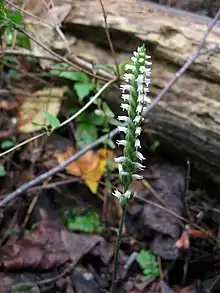| Spiranthes ovalis | |
|---|---|
 | |
| Scientific classification | |
| Kingdom: | Plantae |
| Clade: | Tracheophytes |
| Clade: | Angiosperms |
| Clade: | Monocots |
| Order: | Asparagales |
| Family: | Orchidaceae |
| Subfamily: | Orchidoideae |
| Tribe: | Cranichideae |
| Genus: | Spiranthes |
| Species: | S. ovalis |
| Binomial name | |
| Spiranthes ovalis | |
Spiranthes ovalis, commonly called the October lady's tresses,[1] is a species of orchid that is native to eastern North America.
Its range is widely distributed, being found from Texas to Florida, north to the Great Lakes.[2] However, it is uncommon throughout most of its range,[3] which has resulted in a patchy known distribution. Its natural habitat is in wet to mesic forests and woodlands.[3][4]
It produces delicate white flowers in the fall.[5] It can be distinguished from other Spiranthes in eastern North America by its small, tightly spiraled flowers, and the presence of basal leaves at flowering time.[3][4]
Taxonomy
Two varieties of Spiranthes ovalis are recognized.[6] They are:
- S. ovalis var. erostellata - Flowers closed, self-pollinating; widespread across the eastern North America
- S. ovalis var. ovalis - Flowers open, cross-pollinating; restricted to the Southeastern Coastal Plain
References
- ↑ USDA, NRCS (n.d.). "Spiranthes ovalis". The PLANTS Database (plants.usda.gov). Greensboro, North Carolina: National Plant Data Team. Retrieved 19 December 2017.
- ↑ "Spiranthes ovalis". County-level distribution map from the North American Plant Atlas (NAPA). Biota of North America Program (BONAP). 2014. Retrieved 18 December 2017.
- 1 2 3 Spiranthes ovalis North American Orchid Conservation Center
- 1 2 Alan Weakley (2015). "Flora of the Southern and Mid-Atlantic States".
- ↑ MissouriPlants
- ↑ Flora of North America, Spiranthes ovalis
External links
 Media related to Spiranthes ovalis at Wikimedia Commons
Media related to Spiranthes ovalis at Wikimedia Commons Data related to Spiranthes ovalis at Wikispecies
Data related to Spiranthes ovalis at Wikispecies
This article is issued from Wikipedia. The text is licensed under Creative Commons - Attribution - Sharealike. Additional terms may apply for the media files.